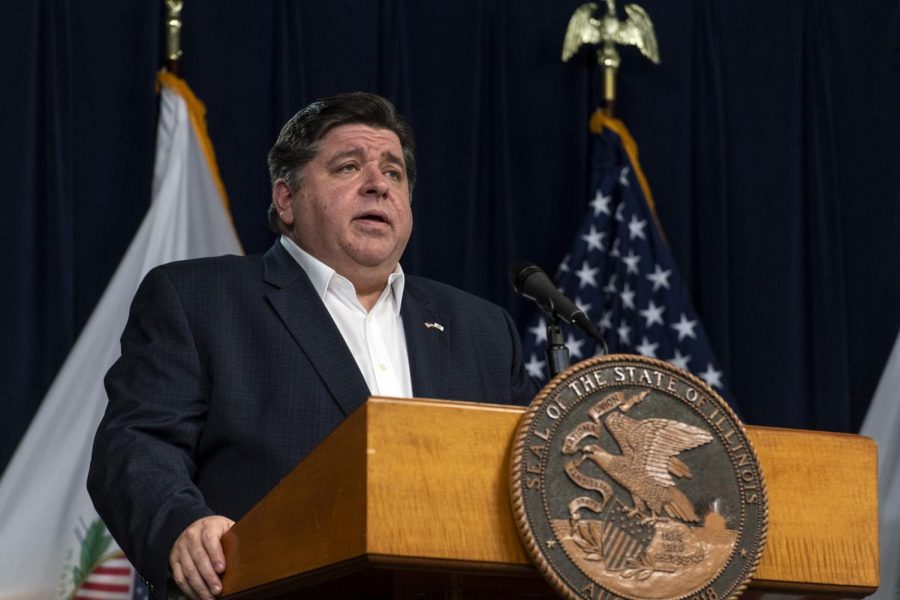Governors around nation take action against COVID-19
Tyler LaRiviere/Chicago Sun-Times via AP
Illinois Gov. J.B. Pritzker, along with other health officials, gives a daily update on the coronavirus outbreak in Illinois, Monday, April 13, 2020, in Chicago.
Amidst fears that COVID-19 will cause an increasing number of cases and deaths as the United States approaches the peak of the pandemic, governors across the nation are working to prevent the worst for their residents.
Governors have the ability to take action in their state to prevent the community spread of COVID-19. As the states continue to feel the seriousness of the pandemic, governors have enforced stay-at-home orders, the temporary closure of non-essential businesses and curfews.
Wayne Steger, a political science professor at DePaul University, says that the governors’ ability to act depends on the cooperation of the respective state legislatures.
“The responses speak directly to their ideological philosophy on governance,” Steger said.
Steger points to Republican governors in Iowa, North Dakota, Texas, Georgia and Florida that have refrained from aggressive action. Florida Gov. Ron DeSantis had a delayed response in enforcing a statewide stay-at-home order. When DeSantis did incite this order, it included exceptions and kept public beaches open. Steger compares this to other Republican governors such as Maryland’s Larry Hogan and Ohio’s Mike DeWine who have taken direct action to prevent the spread of COVID-19.
DeWine took preventative measures against the virus early by shutting down much of the Arnold Sports Festival in Columbus, Ohio before the state had reported a single case. Hogan has been vocal about his dissatisfaction with the Trump administration. “We’re pretty frank and direct in these discussions and we tell the president exactly what we need and what the issues and problems are,” Hogan said to NPR. “We have made progress.”
Seth Richardson, a political reporter for cleveland.com, says that DeWine has received lots of praise from both Republicans and Democrats.
“Besides essentially laying out a roadmap for others to follow,” Richardson said. “I think he’s also given governors in other states some political cover for making hard choices.”
Steger said in Illinois he would like to see more support of the National Guard to enforce quarantines. “I would have liked to see more information and assistance to minority communities which are getting hit much harder,” Steger said.
States have been collecting an increasing amount of racial and ethnic demographic data for those affected by the COVID-19 virus. According to a report from the Cook County medical examiner’s office and the Chicago Department of Public Health, 68 percent of the city’s deaths related to COVID-19 have involved African Americans, who only make up 30 percent of the city’s population. As more reports come out, it is clear that minority communities are disproportionately affected as they often lack equal access to health care.
Bob Griffin, dean of the College of Emergency Preparedness, Homeland Security and Cybersecurity at the State University of New York at Albany, said he’s satisfied with the actions taken by Gov. Andrew Cuomo.
“Cuomo’s leadership absolutely surpasses anything out of the federal leadership,” Griffin said.
“There’s so much uncertainty, people don’t want the name-calling, the school bullying,” he said. Though he points to the majority of Cuomo’s frustration being revealed behind closed doors, he does commend the work of other governors, such as Gov. JB Pritzker, who has publicly revealed his aggravation with the President in speeches and on Twitter.
Though governors have authority in their own state, they still require resources and assistance from the federal government so that the virus is contained nationally.
The governors have made a point to single out the President’s inaction in effectively preventing the spread of the virus and have demanded more support from the federal government so that their state may keep up with the rising number of cases.
Richardson said though the governors seem to be more popular in the public eye due to their actions in the midst of the pandemic, President Donald Trump’s response isn’t necessarily unpopular.
“I think people tend to view government as a whole,” said Richardson. In states that have mitigated the effects of the virus, the people in that state may be more satisfied with the government’s response. Though this may be due to the work of the governor, the praise may be attributed to the president’s actions as well. In some states, the opposite is true.
“The likely outcome, as I see it now, is that states that are hit harder by the pandemic will sour more quickly on the president,” Richardson said. “Not just with the number of sick people or deaths, but with economic struggles as well.”







